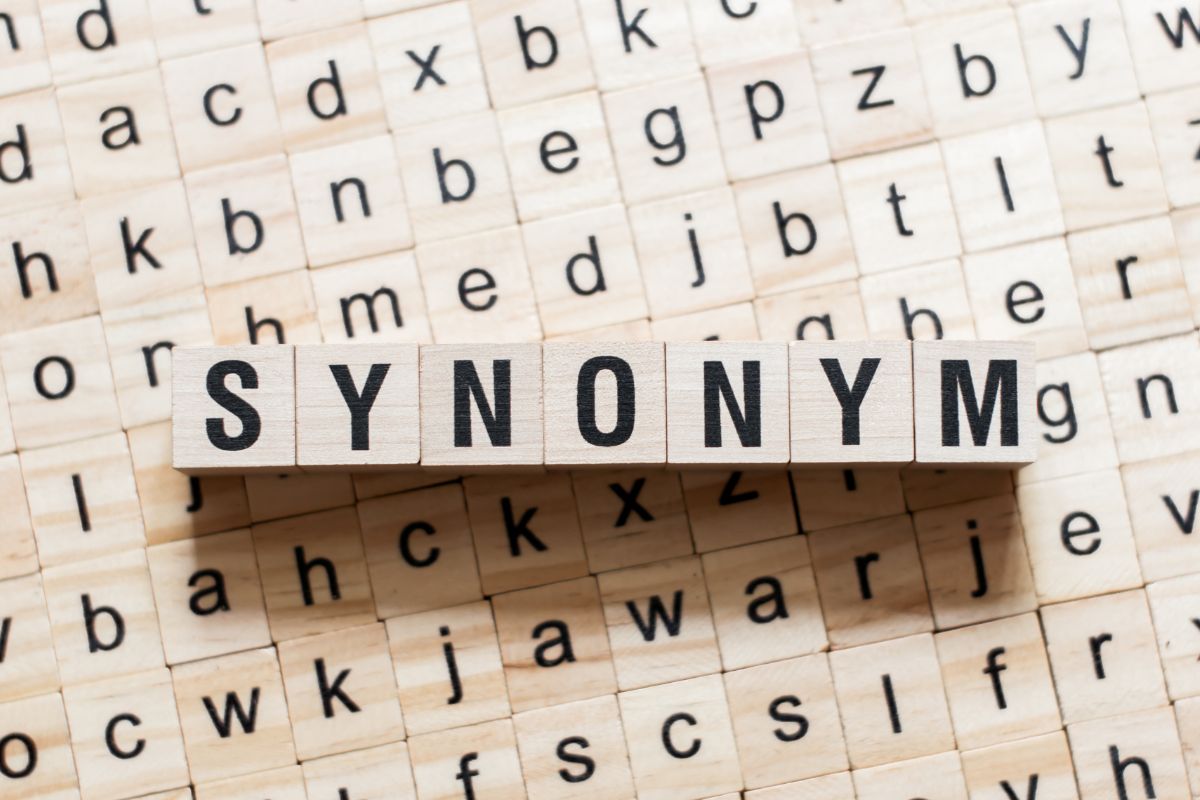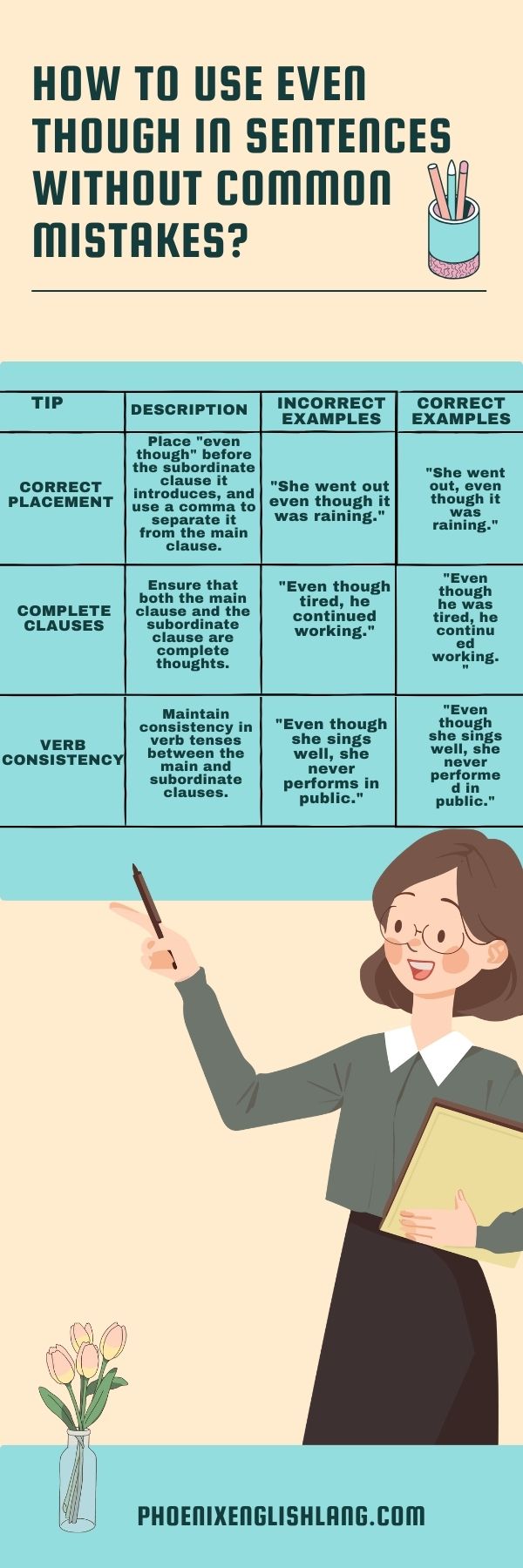Hello, wonderful English learners! Today, we’re exploring a frequently encountered yet sometimes perplexing part of English grammar: the distinction between “even though” and “eventhough.”
Grasping the proper use of these phrases is vital for anyone eager to enhance their writing and speaking abilities. This guide aims to help you master these expressions, ensuring your communication is clear, accurate, and grammatically sound.
By the end of this lesson, you’ll feel confident using “even though” in your sentences and understand why “eventhough” is not recognized as standard English.
In the realm of English grammar, even minor details can significantly impact meaning. “Even though” serves as a conjunction that introduces a subordinate clause, creating a contrast with the main clause.
It’s an effective tool for adding richness and complexity to your sentences, enabling you to convey contrast and unexpected results skillfully.
Conversely, “eventhough” is a frequent misspelling and incorrect usage of “even though.” Identifying and rectifying this error is crucial for anyone aspiring to write in a professional or academic context.
This guide offers an in-depth look at how to properly use “even though,” featuring examples and useful tips. By grasping these ideas, you’ll enhance your ability to communicate clearly and effectively in both spoken and written English.
This is especially beneficial for anyone getting ready for exams, crafting essays, or participating in professional discussions.
By mastering the use of “even though,” you’ll not only refine your grammar but also increase your confidence in using English across different situations.
You might also enjoy: Paid Vs Payed : Differences + Examples [My 2024 Teaching Way]
Key Points to Explore
- Understanding “Even Though”: We will begin by clarifying what “even though” means and its role as a conjunction. This part will explore how it introduces a contrasting clause, enriching your sentences with depth and complexity.
- Frequent Errors: Identify the typical errors people encounter when using “even though,” such as mistakenly writing it as “eventhough.” We will share clear examples to highlight these mistakes.
- Contextual Examples: Explore the various ways “even though” can be applied in different situations. We will present a range of examples from casual conversations, academic texts, and professional exchanges to demonstrate the effective use of this conjunction.
- Practice Exercises: To reinforce your learning, we will include practice exercises that you can complete to test your understanding of the material. These exercises will help you apply what you have learned and ensure that you can use “even though” correctly in various contexts.
- Advanced Usage: For those eager to deepen their knowledge, we will delve into some sophisticated applications of “even though,” examining its function in intricate sentence formations and its significance in literary and rhetorical settings.
- Tips and Tricks: Lastly, we will share some helpful tips and tricks to remember how to use “even though” correctly. These useful mnemonics and techniques will assist you in steering clear of common mistakes and using this conjunction with assurance.
By the conclusion of this guide, you will possess a comprehensive grasp of the proper use of “even though” and understand why “eventhough” is not recognized in standard English.
You will be equipped to form sentences with improved precision and confidence, along with the resources to keep enhancing your English grammar abilities. So, let’s set off on this adventure to master “even though” and boost your communication skills!
You might also enjoy: Have Got vs Have: Differences + Usage + Examples [2024]
Synonyms for “even though” include

| 1. Although |
| 2. Despite |
| 3. In spite of |
| 4. Notwithstanding |
| 5. Regardless |
| 6. While |
| 7. Nevertheless |
These synonyms can be used interchangeably in sentences to convey a similar meaning of contrast or concession.
The opposite of “even though” in terms of conveying contrast or concession could be:
| 1. Despite that |
| 2. Nevertheless |
| 3. Yet |
| 4. Still |
| 5. Nonetheless |
These words can be used to introduce a contrasting idea or condition similar to “even though.”
You can use “even though” when you want to express a contrast or unexpected situation in a sentence. For example:
– “Even though it was raining, they decided to go for a hike.”
– “Even though she was tired, she continued working on her project.”
– “Even though the movie received mixed reviews, it was a box office success.”
In each case, “even though” introduces a contrasting element to what might be expected in the given situation.
- Here are examples of sentences with “even though,” demonstrating its placement:
- They decided to go for a hike, even though it was raining.
- She continued working on her project, even though she was tired.
- It was a box office success, even though the movie received mixed reviews.
In these examples, “even though” is placed after the main clause and before the contrasting or unexpected element, highlighting the contrast in each situation.
Certainly! Here are sentences demonstrating the application of “even though”:
- Despite the challenges, he decided to pursue his dream job even though it required relocating.
- She completed the marathon even though she had never run such a long distance before.
- Even though they had reservations, the couple went ahead and tried the new restaurant in town.
In these sentences, “even though” is used to introduce a contrasting or unexpected element that goes against the preceding information.
“Even though” and “eventhough” are essentially the same phrase; however, “even though” is the more commonly accepted and widely used form.
They have the same meaning and can be used interchangeably to introduce a contrasting or unexpected element in a sentence.
Stick with “even though” for broader clarity and acceptance in written and formal communication.
- Here’s an example of a question sentence using “even though”:
– Even though it’s late, are you still planning to attend the meeting?
In this question, “even though” introduces the contrasting element of lateness, emphasizing the inquiry about the person’s intention to attend the meeting despite the late hour.
“Even though” is a conjunction used to introduce a contrast or concession in a sentence.
When using “even though” in a sentence, it’s important to pay attention to the structure.
You might also enjoy: Canceled or Cancelled: Grammar + Examples + Usage [2025]
Typically, it is followed by a subordinate clause that presents the unexpected or contrasting information. Here’s a simple grammar structure:
Main Clause + Even though + Subordinate Clause
For example:
– “She decided to go for a run, even though it was raining.”
In this sentence, the main clause is “She decided to go for a run,” and the subordinate clause introduced by “even though” is “it was raining,” presenting the contrasting weather condition.
- Here’s an example sentence using “even though”:
“Even though it was a long journey, they enjoyed every moment of the road trip.”
In this sentence, “even though” introduces a contrasting element, emphasizing that despite the journey being long, the enjoyment of the road trip prevailed.
- Here’s an example of “even though” in a negative sentence:
“They didn’t win the game, even though they played exceptionally well.”
In this negative sentence, “even though” is used to highlight the contrast between the team’s excellent performance and the fact that they did not win the game.
“Even though” is a conjunction used to introduce a contrast or concession in a sentence.
It implies that despite a particular condition or situation, something else is still true. It’s often used to express unexpected or contradictory information.
For example: “He went to the party, even though he wasn’t feeling well.” In this sentence, “even though” introduces the contrasting information that he attended the party despite not feeling well.
You can use “even though” to express a contrast or concession in your sentences. Here’s a basic structure to help you incorporate it:
- Main Clause + Even though + Subordinate Clause
For example:
– “She decided to go for a walk, even though it was cold outside.”
– “He accepted the job offer, even though the salary was lower than expected.”
In both examples, “even though” introduces a contrasting element that emphasizes a decision or action despite unfavorable conditions or expectations. Feel free to apply this structure based on the context of your sentences.
Should I put comma after Even though ?
Yes, when you use “even though” to introduce a subordinate clause, it is common to place a comma after it. Here’s an example:
“He decided to go for a walk, even though it was cold outside.”
The comma helps clarify the structure of the sentence, separating the main clause (“He decided to go for a walk”) from the subordinate clause introduced by “even though” (“it was cold outside”).
You might also enjoy: Sale Vs Sell: Differences + Examples + Usage [2024]
Caneven though be used in a complex sentence?

Yes, “even though” is often used in complex sentences. A complex sentence is one that includes an independent clause (a complete thought) and at least one dependent clause (a fragment that cannot stand alone).
- Here’s an example of a complex sentence with “even though”:
Complex Sentence Structure:
“He went for a run, even though he was tired.”
– Independent clause: “He went for a run.”
– Dependent clause: “Even though he was tired.”
In this example, the sentence is complex because it consists of both an independent and a dependent clause. The use of “even though” introduces a contrasting element in the dependent clause.
What comes before even though?
“Even though” typically comes before a dependent clause in a sentence. The dependent clause introduced by “even though” provides contrasting or unexpected information to what is stated in the main clause.
- Here’s a general structure:
Main Clause + Even though + Dependent Clause
For example:
“He decided to go for a walk, **even though** it was cold outside.”
In this sentence, the main clause is “He decided to go for a walk,” and the dependent clause introduced by “even though” is “it was cold outside,” presenting a contrasting condition.
Is even though the same as despite?

Yes, “even though” and “despite” are similar in meaning and can often be used interchangeably.
Both expressions are used to introduce a contrasting or unexpected element in a sentence. The key difference is the structure of the sentence:
– “Even though” is often followed by a full clause, both independent and dependent, to provide more detailed information.
Example: “He went for a walk, even though it was raining.”
– “Despite” is usually followed by a noun or a gerund (verb form ending in -ing).
Example: “He went for a walk despite the rain.”
In many cases, you can choose between “even though” and “despite” based on the structure you prefer or the context of your sentence.
You might also enjoy: Paid Vs Payed : Differences + Examples [My 2024 Teaching Way]
What type of clause is even though?
“Even though” introduces a type of adverbial subordinate clause called a concessive clause.
A concessive clause indicates a contrast or concession, expressing something that goes against the expected outcome or condition of the main clause.
In the sentence “Even though it was raining, they decided to go for a walk,” the clause “Even though it was raining” is concessive, providing contrasting information to the main clause “they decided to go for a walk.”
Can I say even though in an essay?
Yes, you can certainly use “even though” in an essay. It’s a useful and appropriate conjunction to introduce contrasting or unexpected information.
Including phrases like “even though” can enhance the complexity and nuance of your writing, allowing you to express concessions or contradictions.
For example:
“Even though some critics argue against this viewpoint, the evidence overwhelmingly supports the proposed solution.”
Just ensure that the usage fits the tone and purpose of your essay, and it helps convey your ideas effectively.
How to use even though in sentences without common mistakes?

To use “even though” in sentences without common mistakes, consider the following tips:
| 1. Correct Placement: Place “even though” before the subordinate clause it introduces, and use a comma to separate it from the main clause. |
| – Incorrect: “She went out even though it was raining.” |
| – Correct: “She went out, even though it was raining.” |
| 2. Complete Clauses: Ensure that both the main clause and the subordinate clause are complete thoughts. |
| – Incorrect: “Even though tired, he continued working.” |
| – Correct: “Even though he was tired, he continued working.” |
| 3. Verb Consistency: Maintain consistency in verb tenses between the main and subordinate clauses. |
| – Incorrect: “Even though she sings well, she never performs in public.” |
| – Correct: “Even though she sings well, she never performed in public.” |
By following these guidelines, you can use “even though” effectively and avoid common mistakes in your sentences.

Hi, welcome to my blog! My name is Omid and I am thrilled to have you here! I am an English language teacher with 12 years of experience and hold multiple international certifications (TESOL, IELTS, TOEFL, PTE, CELTA). Additionally, I hold a PhD in Applied Linguistics with a specialization in Teaching English as a Second Language (TESL), which fuels my passion for teaching English and assisting others in mastering the language. To me, nothing is more rewarding than helping individuals enhance their English language abilities through various methods. So, let’s embark on this journey of learning English together.




